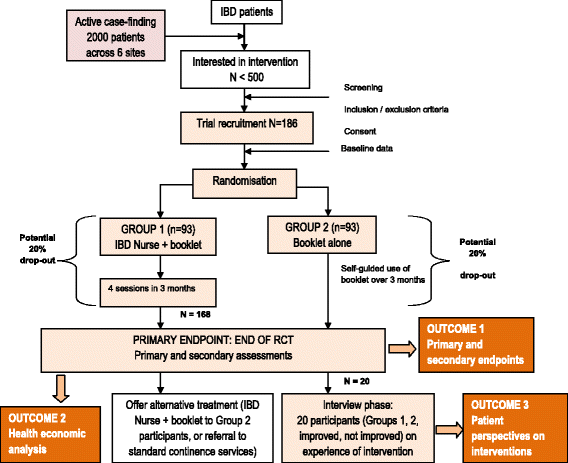Faecal incontinence intervention study (FINS): self-management booklet information with or without nurse support to improve continence in people with inflammatory bowel disease: study protocol for a randomized controlled trial
- PMID: 26445224
- PMCID: PMC4594995
- DOI: 10.1186/s13063-015-0962-0
Faecal incontinence intervention study (FINS): self-management booklet information with or without nurse support to improve continence in people with inflammatory bowel disease: study protocol for a randomized controlled trial
Abstract
Background: Inflammatory bowel disease, comprising Crohn's disease and ulcerative colitis, is a life-long currently incurable illness. It causes bouts of acute intestinal inflammation, in an unpredictable relapsing-remitting course, with bloody diarrhoea and extreme urgency to access a toilet. Faecal incontinence is a devastating social and hygiene problem, impacting heavily on quality of life and ability to work and socialise. Faecal incontinence affects 2-10 % of adults in the general population. People with inflammatory bowel disease have a high risk of incontinence with up to 74 % affected. No previous study has explored conservative interventions for these patients.
Methods: This randomised controlled trial will recruit 186 participants to answer the research question: does implementation of the UK nationally recommended guidance approach to stepwise management of faecal incontinence improve bowel control and quality of life in people with inflammatory bowel disease? We have worked with people with inflammatory bowel disease to translate this guidance into a condition-specific information booklet on managing incontinence. We will randomise participants to receive the booklet, or the booklet plus up to four 30-minute sessions with an inflammatory bowel disease specialist nurse. To be eligible, patients must be in disease remission and report incontinence. The primary outcome measure at 6 months after randomisation is the St Mark's incontinence score. Other outcomes include quality of life, MY-MOP (generic tool: participants set two goals for intervention, grading goals at baseline and then re-scoring after intervention) and EQ-5D-5 L to enable calculation of quality-adjusted life years. Analysis will be on an intention-to-treat basis. Qualitative interviews will explore participant and health professionals' views on the interventions.
Discussion: Few high-quality studies of conservative interventions in inflammatory bowel disease, and none for faecal incontinence, have been conducted. We have collaborated with patients to design this study. Blinding to this behavioural intervention is not possible, but our self-report outcome measures with a degree of objectivity. There is genuine equipoise between the booklet only and booklet plus nurse arms, and the study will determine if additional support from a nurse is a crucial element in implementing advice.
Trial registration: clinitrials.gov.uk: NCT02355834 (Date of registration: 12 December 2014). Protocol version: 4.0. 08.04.15.
References
Publication types
MeSH terms
Associated data
Grants and funding
LinkOut - more resources
Full Text Sources
Other Literature Sources
Medical


